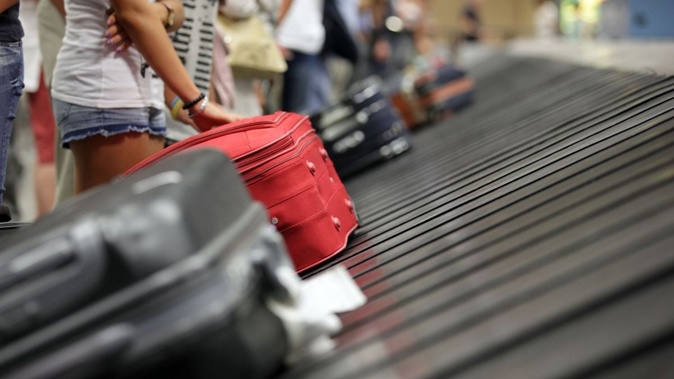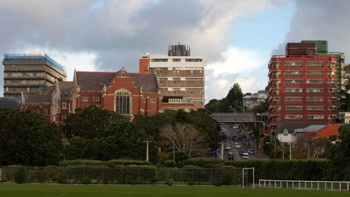
A church youth leader who was found guilty of conspiring with an American rapper and three Air New Zealand baggage handlers in a thwarted attempt to smuggle $8 million worth of methamphetamine via an international flight to Auckland wiped away tears today as he was sent off to begin serving a lengthy prison sentence.
The 47-year-old, who for legal reasons cannot yet be identified, was described by prosecutors during his sentencing hearing today as the “architect” of the May 2020 scheme - a respected member of the community with no prior record who used his seniority and “mana” to recruit the younger co-conspirators.
“I ... have struggled to put this offending in context, because it seems very contradictory to who you are,” Manukau District Court Judge Janey Forrest said as she referred to the many character references the defendant had received from fellow church members and others in the community.
He was repeatedly described in the letters as a family man and mentor to young people, either through religion or his role in youth sports.
Nonetheless, the judge agreed with the Crown that he had a leading role in the methamphetamine plot. She ordered a sentence of 14 years and seven months’ imprisonment.
The defendant - along with the baggage handlers and musician Romney Fuki Fukofuka, otherwise known by the stage name Konecs - were arrested after Customs intercepted 19.4kg of methamphetamine as the flight from Los Angeles arrived at Auckland Airport.
Just five days earlier, Fukofuka, a South Auckland resident who was born in American Samoa, had departed from Auckland to the United States using his US passport. He was already under surveillance as part of an undercover investigation dubbed Operation Santana, and his quick return amid the nation’s strict Covid-19 lockdown raised more red flags.
The prosecution is believed to be the first in New Zealand for an attempted - albeit failed - drug-smuggling technique known as “rip on, rip off”. The method involves having inside men at both airports to help steer the contraband away from the usual screening spots.
/cloudfront-ap-southeast-2.images.arcpublishing.com/nzme/ASY44C2KZRASDN4BW42MXVE3SM.jpg)
The suitcase in which 19.4 kilograms of methamphetamine was discovered at Auckland Airport in 2020 as part of Operation Santana. Five men have now been sentenced. Photo / Customs
“I panicked. I made a mistake,” Fukofuka previously told the Herald of how the plan went awry, explaining that he was paranoid due to his own use of methamphetamine.
Instead of leaving the baggage at the agreed drop point at Los Angeles International Airport, he took the haul onto the plane with him.
A new plan had to be made on the fly, and the current defendant instructed Fukofuka to instead place the carry-on baggage on the luggage carousel upon arrival at Auckland Airport, where the defendants would retrieve it. But Customs officers approached him as he attempted to do so and searched the bag.
Among the items that Customs seized from Fukofuka at the airport were three mobile phones, each of which were found to have encrypted messaging apps. Authorities found a photo of an Air New Zealand work roster on one of the phones.
Baggage handlers Mark Anthony Castillo, Daniel John Ah Hong and George Aloha Taukolo each pleaded guilty to one count of conspiracy to import methamphetamine and were sentenced in December 2022 to one year of home detention. Fukofuka also pleaded guilty to multiple charges and was sentenced last May to seven years and three months in jail.
/cloudfront-ap-southeast-2.images.arcpublishing.com/nzme/T36C2UXK5ENB6SCMCLI2FZSBGI.jpg)
Konecs, aka Romney Fukofuka, was an aspiring musician who released a number of music videos online. Image / YouTube
The current defendant, however, maintained his not guilty plea and wasn’t convicted until a jury found him guilty in September of a single count of importing methamphetamine, which carries a maximum possible sentence of life imprisonment.
The baggage handlers had testified at his trial, describing how they had been approached weeks earlier and met in the driveway of the defendant’s home just hours before the drugs were to arrive. Two of the witnesses said they had been lured with the promise of a $20,000 payout. The defendant, it was alleged, encouraged them to download encryption apps on their phones.
Defence lawyer Jerome Webby suggested during today’s hearing that it would be an exaggeration to describe his client as the “architect” of the plan.
“The Crown is trying to infer a level of sophistication which was not present on the facts,” he said, describing the defendant as someone with no prior criminal experience who participated in a single, failed importation attempt. “He’s clearly below other people - taking directions from other people.”
/cloudfront-ap-southeast-2.images.arcpublishing.com/nzme/XGXYTZJXKZGNTPPUCJSQSZJJZ4.png)
Part of the 19.4 kilograms of smuggled methamphetamine seized at Auckland Airport in Operation Santana. Photo / Customs
But Crown prosecutor Anna Devathasan said it was clear that the defendant had three major leading roles in the plot: directing Fukofuka as the “unwitting mule who was put in the position of most risk”, recruiting the baggage handlers to serve as “catchers” of the drugs, and communicating with an unknown fourth party who would have bought the drugs had the scheme panned out.
“This was a sustained, sophisticated and highly planned set of offending,” she said.
Devathasan asked the judge to also order a minimum non-parole period of 40 per cent of the end sentence as a deterrence to others in positions of trust who might be enticed by plots that “compromise the integrity of the border”. The judge ultimately declined, noting that as a matter of law he will already have to serve at least one-third of the sentence before he can apply for parole, and that most prisoners fail to persuade the Parole Board at their first appearance.
After today’s hearing, Customs released a statement noting that the “criminal enterprise” had been uncovered well before any of the defendants knew that law enforcement was onto them.
“Customs understands the temptations or coercion that people working at airports and maritime ports can face with the promise of money, protection, or other enticements,” said Customs investigations manager Dominic Adams. “Today’s result sends a clear signal – you lose everything – money, time with family, future career prospects.
“Customs has eyes and ears on the ground more than you think. Not just our own officers, we have the support of partner agencies and industry colleagues including airports and airlines.”
Craig Kapitan is an Auckland-based journalist covering courts and justice. He joined the Herald in 2021 and has reported on courts since 2002 in three newsrooms in the US and New Zealand.
Take your Radio, Podcasts and Music with you









